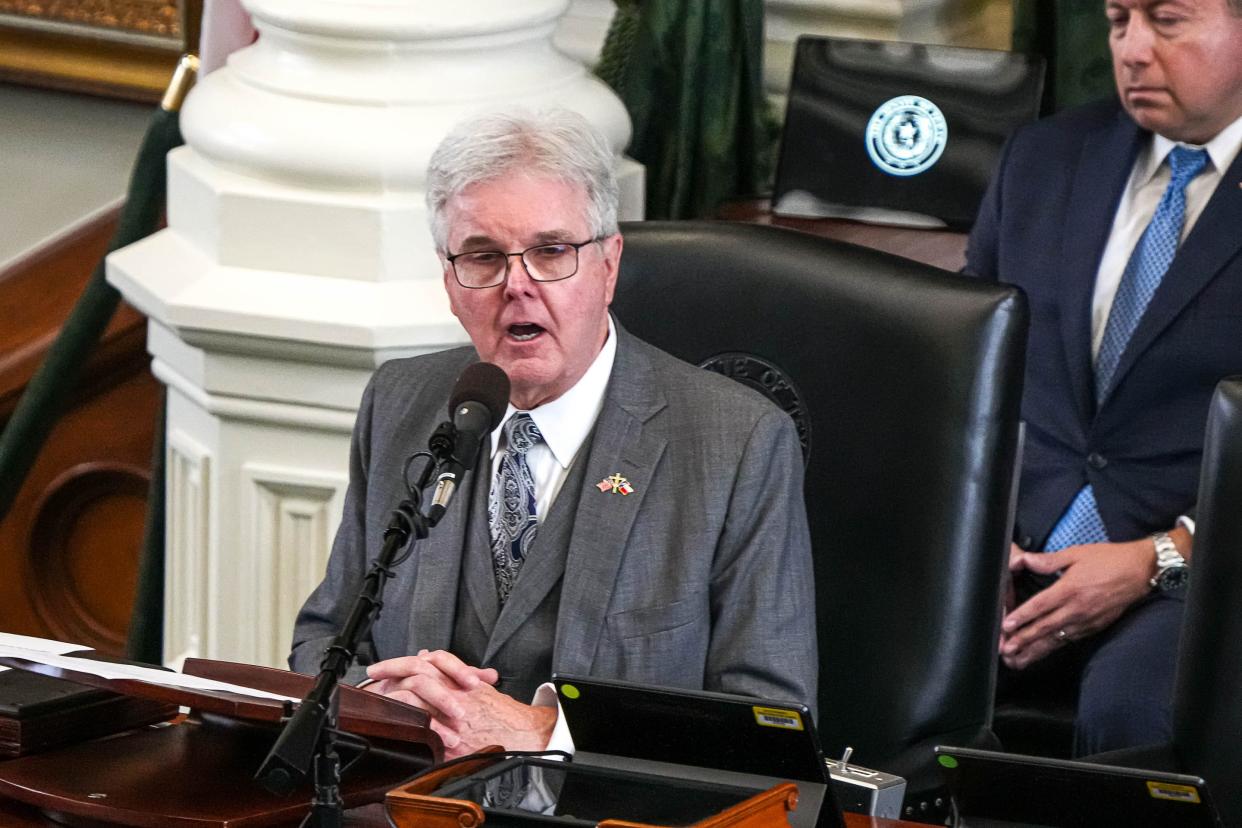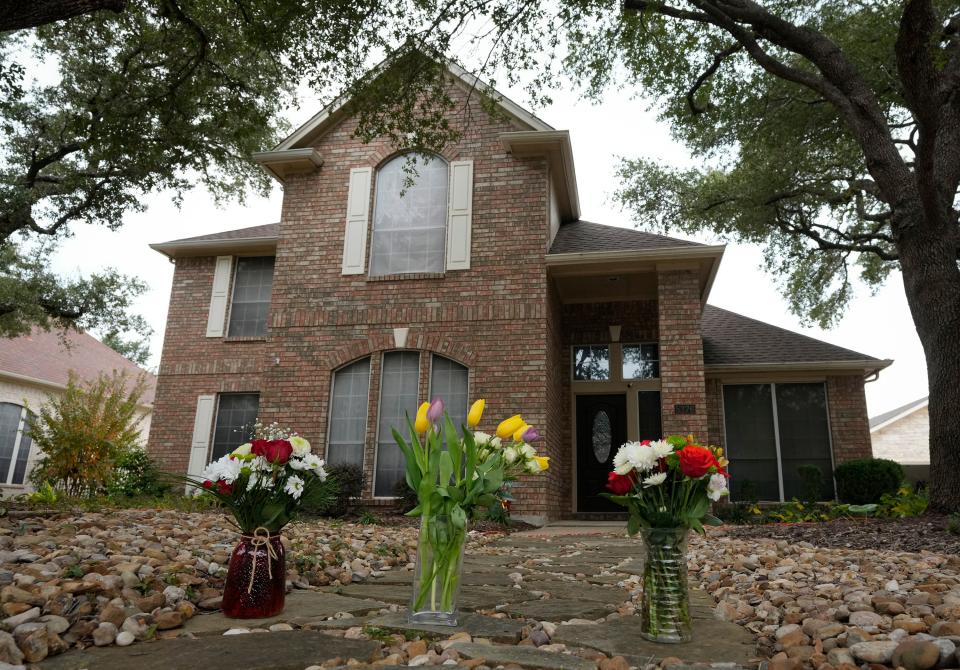Patrick dropped the push for background checks that could've saved Texans' lives | Grumet

Editor's note: This column has been updated to clarify the proposed federal rule change on which gun sellers must be licensed came after the passage of the Bipartisan Safer Communities Act.
Ed Scruggs didn’t know anything more than the neighbors frantically texting him on Dec. 5, panicked over the sounds of gunfire in their Circle C neighborhood. But in the week since a string of shootings from San Antonio to Austin left six people dead — including a mother and daughter just a few blocks from Scruggs’ home — one revelation brought bitter clarity:
The suspect in the shootings, beset by legal and mental health problems, got his gun through a private sale, sidestepping a background check.
“And in my mind, it was just like, 'Of course he did,’ ” said Scruggs, a former board member with Texas Gun Sense, a gun safety advocacy group.
This is precisely the kind of problem Lt. Gov. Dan Patrick vowed to tackle in 2019, then inexplicably abandoned — the danger of stranger-to-stranger gun sales allowing unfit people to get a gun without a background check. Back then, Scruggs had hope and a seat at the table in Gov. Greg Abbott's closed-door roundtable discussions on gun violence.
Patrick forcefully argued for expanding background checks to private gun sales between strangers after the 2019 Midland-Odessa shooting, in which seven people were killed and 25 injured by a gunman who, having failed a background check at a licensed gun shop, went to a private seller to get his gun.
That came after mass killings that turned on different failures: the 2019 El Paso Walmart shooting, in which 23 were killed and 26 injured; the 2018 Santa Fe High School shooting, in which 10 were killed and 13 were injured; and the 2017 Sutherland Springs church shooting, in which 26 were killed and 20 were injured.
“Patrick made a point of being very open about (how) ‘we've got to do something’ — I remember him specifically using the words — ‘we’ve got to do something about this problem or we will be overrun,’ ” Scruggs told me last week.
He remembers Patrick looking at the Texas State Rifle Association representatives in the room and expounding on the risks with stranger-to-stranger gun sales, “that there just seemed to be holes in it, that it was dangerous, that it could inspire gun trafficking … and he thought we should do something about it,” Scruggs added.
Patrick took the same message to the public, telling Fox News in September 2019 that 10% to 15% of guns were sold between strangers with no background check.
“They don't know who they're selling to,” Patrick said with urgency. “It could be a felon, could be someone getting ready to rob a bank or someone (who’s) ready to commit an act of violence, and we have to stop the stranger-to-stranger sales.”
Patrick, a longtime gun rights advocate, even told The Dallas Morning News in September 2019 that he was “willing to take an arrow” from the gun lobby to shore up background checks.
But then: nothing. When the next legislative session arrived in 2021, a bill to address these background checks (Senate Bill 163) didn’t even get a hearing in the upper chamber, which Patrick controls.
“It just disappeared,” Scruggs said.
Sizable loophole puts public at risk
It’s still astonishing that such a bold call to action by one of our state’s most powerful elected leaders simply evaporated. Patrick's office didn’t respond last week to my questions. Neither did the Texas State Rifle Association, the state affiliate of the National Rifle Association, whose political arm gave Patrick an A+ rating last year.
Patrick would have had the public on his side for expanded background checks. Polling from the University of Texas/Texas Politics Project shows 78% of Texans support or “somewhat support” requiring background checks for all gun purchases. That’s true even among 68% of Texans who identify as strong Republicans and 65% of Texans who identify as extremely conservative.
Federal law requires background checks for any sales by a licensed firearms dealer, but not for “private sellers” who sell a gun from their personal collection — an exemption federal officials have acknowledged is exploited by unlicensed dealers. Twenty-one states have laws extending background checks to at least some private sales. Texas does not.
This is a sizable loophole. A 2015 survey found 1 in 5 U.S. gun owners got their most recent gun without undergoing a background check. And an analysis by Everytown for Gun Safety found that as many as 1 in 9 people trying to buy a firearm on armslist.com, the nation’s largest online gun marketplace, are people who are legally prohibited from owning firearms.
Scruggs marveled at the ease of such sales.
“You can meet (a private seller) in a Walmart parking lot and you can purchase a gun out of their trunk (with) cash — they don’t even have to ask you for any ID or anything,” Scruggs said. “That’s how easy it is, and I’m not sure that people are aware of that until events like (last week’s rampage) happen.”
Stronger rules coming from the feds
The federal government is finally tightening this loophole. After the passage of the Bipartisan Safer Communities Act, which was championed by U.S. Sen. John Cornyn, R-Texas, and signed last year by President Joe Biden, the Bureau of Alcohol, Tobacco, Firearms and Explosives started revising its definitions of the types of gun sellers who need to be licensed — and therefore required to conduct background checks.
Previously, vendors had to be licensed if they made their living through gun sales — a standard that overlooked people who sold guns as a side hustle. The proposed rules would require licensing of anyone selling guns with the goal of making a profit, pulling in those part-time dealers.
Scruggs acknowledged that background checks won’t prevent every tragedy. But if someone is facing criminal charges, or has a bail condition prohibiting gun ownership or has a documented history of mental health issues — all true of Shane James Jr., the 34-year-old man accused of the Dec. 5 string of shootings — why make it easier for such a person to buy a gun without any scrutiny?

Austin police said they are talking with the person who sold the .45-caliber pistol to James. In an unsigned email from the Police Department's media office, the agency declined to elaborate on how James and the seller met, where the transaction took place or whether the seller might face any charges.
(The man who sold the gun to the Midland-Odessa shooter was sentenced to two years in prison, after the feds determined he was acting as a firearms dealer without having a license or paying taxes on that income.)
Scruggs and his neighbors remain rattled by last week’s shooting, especially the horrific randomness of it. The gunman could have picked anyone’s door.
“It's an indication to me that this problem is everyone's problem,” Scruggs said. “It can happen anywhere at any time, and it will impact you in some way at some point.”
But it’s also a reminder that four years ago Patrick offered to “take an arrow” over tighter background checks — then he quietly dropped the matter, leaving Texans with a greater risk of facing real bullets.
Grumet is the Statesman’s Metro columnist. Her column, ATX in Context, contains her opinions. Share yours via email at bgrumet@statesman.com or via Twitter at @bgrumet. Find her previous work at statesman.com/news/columns.
This article originally appeared on Austin American-Statesman: Texas Lt. Gov. Dan Patrick didn't fix the private gun sales problem

